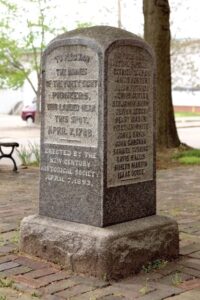God’s guaranteed income
By Mark Wilmoth
Kelsey Piper, a well-respected Stanford grad who is appreciated in liberal circles because of her consistent emphasis on effective altruism and her association with publications like Vox and The Argument, recently raised eyebrows when she published a column headed “Giving People Money Helped Less Than I Thought It Would.” In the column, Piper laments the failure of a liberal tenet: Guaranteed Basic Income. Piper, like many on the left, once believed that those in crisis – single moms, the homeless and families struggling with poverty – would be able to turn their lives around if they were just given the money to do so. Piper admitted that she thought that, provided a basic income, those folks “would lead better lives, get better educations and jobs and care more for their children and achieve better health outcomes.”
In her column, Piper confesses her shock in discovering that this solution does not work. In numerous controlled studies across the nation, Piper said, “Homeless people, new mothers and low-income Americans all over the country received thousands of dollars. And it’s practically invisible in the data. On so many important metrics, these people are statistically indistinguishable from those who did not receive this aid.” Piper goes on to admit that “giving low-income people money…does not advance other policy priorities. It will not (at any detectable level) make them measurably healthier or happier, or get them a better job, or improve their children’s intellectual development.” Piper concludes that while the giving of cash in emergency situations may still be helpful and justified, a guaranteed monthly income is not a useful tool in the war on poverty.
No real student of the Bible can doubt God’s concern for those in need. The Old Testament Law included provisions that set aside the edges of fields for the poor and prohibited vineyard owners from going back over their vines a second time during harvest, leaving that part of the crop for the poor to glean. The tribal distribution of land and the observance of Sabbatical Years and the Year of Jubilee was intended to ensure that “…there should be no poor among you, for in the land the LORD your God is giving you to possess as your inheritance, he will richly bless you” (Deuteronomy 15:4, NIV). Jesus’ ministry healed many who were disabled, and the early church quickly accepted its responsibility to care for widows, orphans and the poor. The apostles taught that the rich were “not to be arrogant nor to put their hope in wealth, which is so uncertain, but to put their hope in God, who richly provides us with everything for our enjoyment. Command them to do good,” Paul wrote in 1 Timothy 6:17-19, “to be rich in good deeds, and to be generous and willing to share. In this way they will lay up treasure for themselves as a firm foundation for the coming age, so that they may take hold of the life that is truly life.”
Given God’s concern for the poor, it’s instructive to note that He makes no provision in Scripture for a guaranteed income. While those with severe disabilities and difficult circumstances are to be generously provided for, God’s plan is for poor people to be helped so that they can provide for themselves when possible. Farmers leave the edges of their fields for the poor to glean, but they don’t harvest the grain and give it to them. Rather, the poor are given the means and opportunity to harvest for themselves. Widows in the church received help from the church, but they served the church in return for their daily provisions. They found fulfillment in performing useful labor and maintained their dignity in the eyes of others. Families are to look after their own who are in need and those with one kind of need can help others with a different kind of need. With this system, folks receive the assistance they need, but retain their sense of dignity and contribute toward a better society. Under the biblical safety net, no one will be able to legitimately assert that “the poor are lazy and aren’t willing to help themselves.” In fact, the Bible commands that “If a man will not work, he shall not eat” (2 Thessalonians 3:10). Hunger can motivate substantial reforms and serious effort!
Isn’t it amazing how often the Bible’s answers, centuries old, anticipate the results of modern research studies and pilot programs? God’s pretty smart, isn’t He?
Mark Wilmoth is Pinehurst Christian Church in Marietta and can be reached at Minister@PinehurstChristianChurch.org



